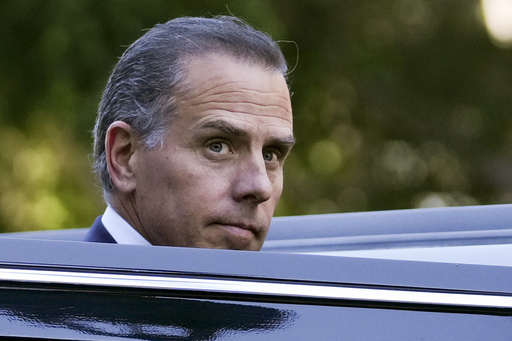WASHINGTON — President Joe Biden has made a surprising move by granting a pardon to his son, Hunter Biden, who was slated to be sentenced for gun and tax-related crimes this month. Initially, President Biden had committed to not issuing a pardon, but he reversed course on Sunday.
The pardon not only addresses Hunter Biden’s convictions in Delaware and California but also encompasses any other potential offenses against the United States that he may have committed between January 1, 2014, and December 1, 2024. While it is not unusual for presidents to use their pardon powers to assist family members or close associates, Biden’s decision contrasts with his previous assertions about adhering to legal principles and norms of governance.
The authority to grant clemency, including pardons and commutations, stems from the U.S. Constitution. A pardon absolves federal criminal offenses, while a commutation merely reduces penalties. This power has historical roots in English law, where kings had the discretion to show mercy. The U.S. Supreme Court has upheld the expansive nature of this presidential authority. Over the years, presidents have utilized this power frequently; for instance, Donald Trump issued 237 acts of clemency during his administration, while Barack Obama granted clemency nearly 1,927 times. The offenses forgiven by various presidents have ranged widely, including drug-related crimes, fraud, and draft evasion during the Vietnam War. It’s important to note, however, that presidents can only pardon federal crimes and not state offenses, and impeachment charges are also excluded from this authority.
As for the specific allegations against Hunter Biden, he was convicted in June for providing false information on a federal form when purchasing a firearm in 2018, claiming he was not a drug user. Additionally, he admitted guilt in a case regarding over $1.4 million in unpaid taxes, with prosecutors pointing out that he led a lavish lifestyle while neglecting his tax obligations. This period marked a tumultuous time in Hunter Biden’s life, riddled with struggles with substance abuse, from which he recovered in 2019.
Following extensive media coverage that revealed unbecoming details about his personal life during the gun trial, Hunter Biden opted to plead guilty to avoid putting his family through another scandalous trial. The tax trial was anticipated to expose further controversial aspects of his international business activities, which have become fodder for Republican accusations of corruption involving the Biden family. He was on track to be sentenced this month by judges appointed by Trump in both California and Delaware.
Questions were raised regarding whether prosecutors would seek incarceration, given that the tax-related charges could lead to 17 years and the gun-related offenses up to 25 years of imprisonment. However, it was suggested that sentencing guidelines might lead to significantly lighter consequences, potentially allowing Hunter Biden to escape jail time.
Following the grant of the pardon, Hunter Biden’s legal representatives filed motions in both California and Delaware, requesting that the respective courts dismiss the charges citing the pardon. However, the office of Special Counsel David Weiss opposed this dismissal, asserting that the cases should be administratively closed rather than entirely erased from the record. Federal prosecutors firmly countered allegations that the cases were politically motivated, stating that despite the pardon, the grand jury’s findings, which led to Hunter Biden’s charges, should not be disregarded.
Earlier in the summer, President Biden had publicly stated that he would refrain from pardoning his son. “I’m extremely proud of my son Hunter. He has overcome an addiction. He is one of the brightest, most decent men I know,” he had expressed, reaffirming his belief in abiding by the jury’s decision. White House spokesperson Karine Jean-Pierre echoed his stance as recently as November 8, indicating that Biden would not extend a pardon to his son.
Biden’s rationale for the reversal of his decision is reflected in his statement on Sunday, where he noted that Hunter had faced “selective and unfair prosecution.” The president has been aware of the political implications surrounding his son’s legal troubles, stating that those prosecuting Hunter were motivated by a desire to undermine him as a political figure. Biden also indicated that the plea deal had fallen apart due to pressure from his political adversaries, asserting that reasonable individuals could see that Hunter was targeted solely because of his familial ties to the president.
Pardon history in the U.S. shows that this is not an isolated incident. Previous presidents have also issued pardons to family members and close associates. Donald Trump granted clemency to Charles Kushner, his son-in-law’s father, and a number of allies implicated in the Russia investigation. Similarly, Bill Clinton pardoned his half-brother, Roger Clinton, after he had served time for drug-related offenses, in addition to pardoning former business partner Susan McDougal after she completed her sentence related to the Whitewater scandal.


